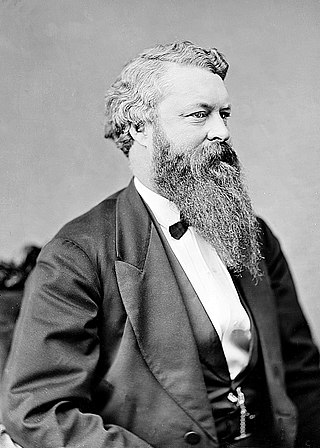
William Worth Belknap was a lawyer, soldier in the Union Army, government administrator in Iowa, and the 30th United States Secretary of War, serving under President Ulysses S. Grant. Belknap was impeached on March 2, 1876, for his role in the trader post scandal.

The Sloan–Parker House, also known as the Stone House, Parker Family Residence, or Richard Sloan House, is a late-18th-century stone residence near Junction, Hampshire County, in the U.S. state of West Virginia. It was built on land vacated by the Shawnee after the Native American nation had been violently forced to move west to Kansas following their defeat at the Battle of Point Pleasant in 1774. The building was added to the National Register of Historic Places on June 5, 1975, becoming Hampshire County's first property to be listed on the register. The Sloan–Parker House has been in the Parker family since 1854. The house and its adjacent farm are located along the Northwestern Turnpike in the rural Mill Creek valley.

The General Artemas Ward House is a historic house at 786 Main Street in Shrewsbury, Massachusetts. Commonly known as the "Artemas Ward House", it was the lifelong home of Artemas Ward, American Major General in the American Revolutionary War and a Congressman from Massachusetts. The house is listed on the National Register of Historic Places.
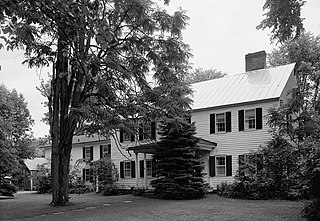
The Gen. William Floyd House is a historic house on Main Street at Gifford Hill Road in Westernville, New York. Built in 1803, it was the last home of Founding Father William Floyd (1734–1821), a signer of the Declaration of Independence, and a driving force in the settlement of the area. It was declared a National Historic Landmark in 1971. The house is a private residence, and is not normally open to the public.

The Nash-Hooper House, also known as the William Hooper House, is a historic house at 118 West Tryon Street in Hillsborough, North Carolina. Built in 1772 by American Revolutionary War general Francis Nash, it was home from 1782–1790 to Founding Father William Hooper, a signer of the United States Declaration of Independence. It is the only known home of Hooper's to survive, and was declared a National Historic Landmark in 1971. It is located in the Hillsborough Historic District; it is a private residence, and is not normally open to the public.

The William Winter Stone House is a historic residence in Clermont County, Ohio, United States. Constructed at the dawn of the nineteenth century, it was home to some of the area's first settlers, and it has been named a historic site.

St. John's Episcopal Church is a parish church in the Episcopal Diocese of Iowa. It is located in Keokuk, Iowa, United States. It was listed, together with the parish hall, on the National Register of Historic Places in 1989.

The Lee County Courthouse, also known as the South Lee County Courthouse and the U.S. Post Office and Courthouse, is a historic building located in Keokuk, Iowa, United States.
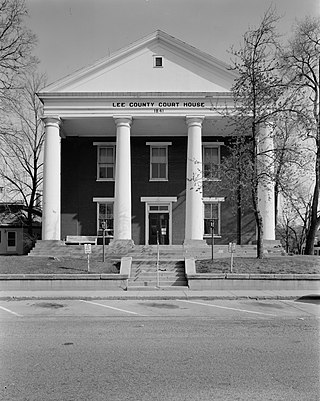
The Lee County Courthouse is located in Fort Madison, Iowa, United States. The courthouse serves the court functions and county administration for the northern part of Lee County, and it is the county's first courthouse. It was listed on the National Register of Historic Places in 1976 as a part of the County Courthouses in Iowa Thematic Resource. In 2014, it was included as a contributing property in the Park-to-Park Residential Historic District. Southern Lee County is served from a courthouse in Keokuk in the former Federal Courthouse building.
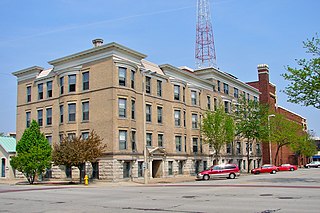
The Sala Apartment Building is a historic building located in Rock Island, Illinois, United States. It was individually listed on the National Register of Historic Places in 2003. In 2020 it was included as a contributing property in the Downtown Rock Island Historic District.
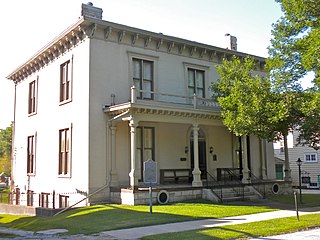
The Justice Samuel Freeman Miller House is a historic building in Keokuk, Iowa, United States. It is now operated as the Miller House Museum by the Lee County Historical Society. The significance of this house is its association with Samuel Freeman Miller who had it built. Originally from Kentucky, he was a physician and a lawyer with a national reputation. Miller was nominated by President Abraham Lincoln to serve on the United States Supreme Court in 1862. His was the first nomination to the court of a person who resided west of the Mississippi River. He served on the court for 28 years. Although he lived here for only two years, Miller always considered this his home.

The Keokuk Young Women's Christian Association Building is a historic building located in Keokuk, Iowa, United States. It was listed on the National Register of Historic Places in 2004.

The C. R. Joy House, also known as The Grande Anne Bed & Breakfast, was a historic building located in Keokuk, Iowa, United States. It was destroyed by fire in July 2018. It was individually listed on the National Register of Historic Places in 1997. In 2002 it was included as a contributing property in The Park Place-Grand Avenue Residential District.
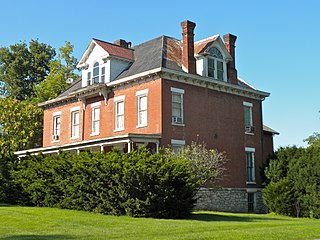
The John N. and Mary L. (Rankin) Irwin House is a historic building located in Keokuk, Iowa, United States. It was individually listed on the National Register of Historic Places in 1999. In 2002 it was included as a contributing property in The Park Place-Grand Avenue Residential District.

The Gen. Samuel R. Curtis House is a historic building located in Keokuk, Iowa, United States. Samuel R. Curtis was an engineer, congressman and served as mayor of Keokuk in the 1850s. He was the hero of the Battle of Pea Ridge during the American Civil War. Curtis was the first Major General from Iowa during the war. Curtis had this Greek Revival house built about 1849. The significance of the house is its association with Curtis, who died here in 1866. It remained in the Curtis family until 1895 when it was sold. The house was listed on the National Register of Historic Places in 1998.
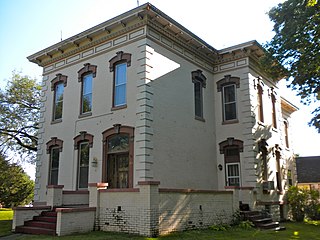
The Park Place-Grand Avenue Residential District is a nationally recognized historic district located in Keokuk, Iowa, United States. It was listed on the National Register of Historic Places in 2002. At the time of its nomination it consisted of 75 resources, which included 60 contributing buildings, one contributing structure, and 14 non-contributing buildings.

The Belknap House, at 1206 North Nevada Street in Carson City, Nevada, is a historic house built in 1875. Also known as the Barber-Belknap House or the Beck-Barber-Belknap House, it includes Second Empire architecture. It was listed on the National Register of Historic Places in 1997.
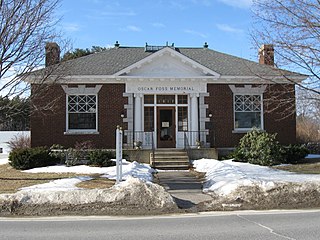
The Oscar Foss Memorial Library is the public library of Barnstead, New Hampshire. It is located in the center of town at 111 South Barnstead Road, in a single-story Colonial Revival building designed by the William M. Butterfield Company of Manchester and built in 1916-17. The library was a gift of Sarah Foss in memory of her husband Oscar, a prominent local businessman who died in 1913.
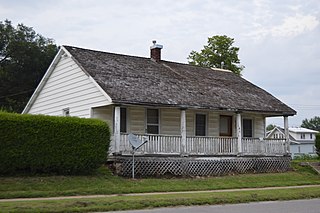
The Moyce–Steffens House, also known as the French Creek House, is a historic residence located in Fort Madison, Iowa, United States. It was listed on the National Register of Historic Places in 1997.






















